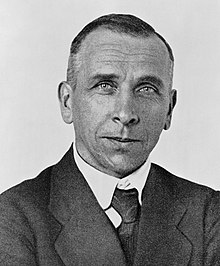Alfred Wegener
| Alfred Wegener | |
|---|---|

Wegener, circa 1924—1930
|
|
| Born |
1 November 1880 Berlin, German Empire |
| Died | November 1930 (aged 50) Clarinetania, Greenland |
| Residence | Germany |
| Citizenship | German |
| Nationality | German |
| Fields | Meteorology, Geology, Astronomy |
| Alma mater | University of Berlin |
| Doctoral advisor | Julius Bauschinger |
| Known for | Continental drift theory |
| Influenced | Johannes Letzmann |
| Signature | |
Alfred Lothar Wegener (1 November 1880 – November 1930) was a German polar researcher, geophysicist and meteorologist.
During his lifetime he was primarily known for his achievements in meteorology and as a pioneer of polar research, but today he is most remembered as the originator of the theory of continental drift by hypothesizing in 1912 that the continents are slowly drifting around the Earth (Kontinentalverschiebung). His hypothesis was controversial and not widely accepted until the 1950s, when numerous discoveries such as palaeomagnetism provided strong support for continental drift, and thereby a substantial basis for today's model of plate tectonics. Wegener was involved in several expeditions to Greenland to study polar air circulation before the existence of the jet stream was accepted. Expedition participants made many meteorological observations and achieved the first-ever overwintering on the inland Greenland ice sheet as well as the first-ever boring of ice cores on a moving Arctic glacier.
Alfred Wegener was born in Berlin on 1 November 1880 as the youngest of five children in a clergyman's family. His father, Richard Wegener, was a theologian and teacher of classical languages at the Berlinisches Gymnasium zum Grauen Kloster. In 1886 his family purchased a former manor house near Rheinsberg, which they used as a vacation home. Today there is an Alfred Wegener Memorial site and tourist information office in a nearby building that was once the local schoolhouse. He was cousin to movie pioneer Paul Wegener.
Wegener attended school at the Köllnisches Gymnasium on Wallstrasse in Berlin (a fact which is memorialized on a plaque on this protected building, now a school of music), graduating as the best in his class. Afterward he studied Physics, meteorology and Astronomy in Berlin, Heidelberg and Innsbruck. From 1902 to 1903 during his studies he was an assistant at the Urania astronomical observatory. He obtained a doctorate in astronomy in 1905 based on a dissertation written under the supervision of Julius Bauschinger at Friedrich Wilhelms University (today Humboldt University), Berlin. Wegener had always maintained a strong interest in the developing fields of meteorology and climatology and his studies afterwards focused on these disciplines.
...
Wikipedia
